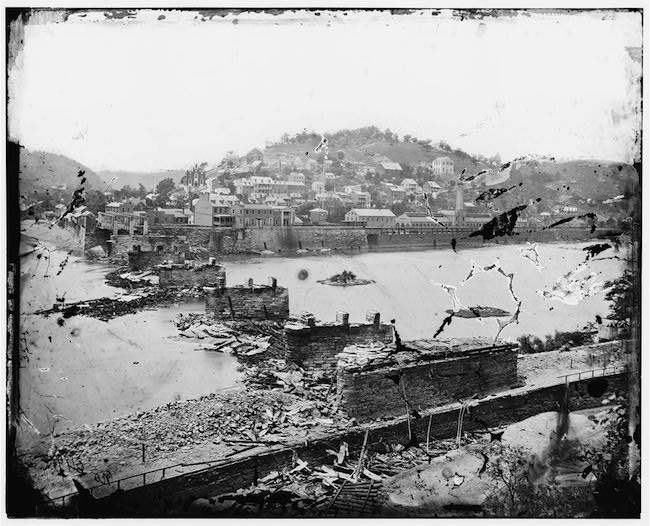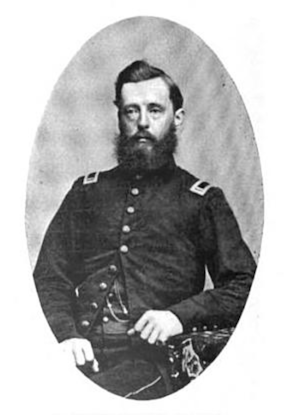October 19th, 1862
Oct 19th
Camp near Harpers Ferry
Dear Wife,
I expected to write you a good letter today, but Col. Ross has disappointed me by committing an outrage against the laws of God and humanity. Sunday is the day for inspection of arms and clothing: when we all have to appear with clean clothes and guns and all our accouterments in apple pie order. Inspection commences at 8 AM and usually ends at nine. Today the Col. gave order that all the men not in the hospital should come out. Now, there are a good many men that are sick that don’t go to the hospital, these all had to come out and what does the old Col. do but keep us out ‘till 12½ o’clock. One man fainted and others had to lay down in the ranks. I did not care for myself, but it excited my indignation to see sick men used in that way. He told me that a man was not sick if he was dying if the doctor did not say he was sick. This he said when I told him that some of our men were not fit to come out. I told him if he wanted to get dying men out he might; I should not and I did not1. I believe the old cuss was drunk. We have got to go on dress parade this afternoon, so you see how much time I have to write and I am so provoked that I can’t think of anything but that old Col.
I shall finish this letter this evening, but I have no good place to write by candlelight.
I received your letter notifying me that you womenfolk had on a box to us, God bless you for that, it seems to bring us nearer home to receive such things for we have substantial proof that we are beyond your love and care. The things you send will be most acceptable, they are just what we need most, but I don’t recollect as you spoke of sending any butter. If you send again I wish you would put some in. We have not received the boxes, but I have no doubt that we shall soon, for boxes have come pretty straight lately. Sergt. Paddock received his in four days. The articles were all in good shape. A box sent to Arlington Heights he has not received yet.
We have lived very well for soldiers lately and I guess we shall if we don’t have to move, and Gen. Kane thinks we will not in some time, a month or more. I should like to winter farther south, that is if the war lasts and I have no doubt it will.

Yesterday I went with the Capt. down to Harpers Ferry and I had a bath in the Potomac, which is here about as large and the Quinnipiac at North Haven. The Shenandoah empties into it at this place. The Shenandoah is about as large as Mill River above Brockett’s [property]. Harpers Ferry is about as large as Centreville but is not so good-looking a place. The public buildings have all been burnt and the private houses are very poor. The war has ruined the place but it will have a place on the pages of history that will make its name immortal. It has changed hands no less than six times and is also noted as being the place that John Brown held against the state of Virginia for two days and the place that Gen. Miles surrendered with 1,000 men to the rebel Gen. Jackson2. It was the most damnable piece of business of the whole war; one thousand men with the artillery that Miles had ought to have held the place against the whole rebel force. They [(the rebels)] had to pass through a narrow cut between the mountains where cannon could have raked them clean but Miles surrendered 1,000 and fifty pieces of the best artillery3 when if he had held on we should have taken the whole rebel force and ended the war. How we have suffered for competent leaders.
We came back to our camp over Maryland Heights, which is a mountain about as high as Mt. Carmel, from the tip of which we had a view of the most splendid landscape that could be thought of. The two rivers glistened in the sun as far as the eye could reach, one running from the northwest and the other from the south through splendid fields and beautiful groves of woodlands. I looked upon this beautiful picture of God’s handiwork (which even this devastating war has failed to spoil) with awe and pleasure. The remembrance of it will remain with me as long as I live. I wish you could have stood there with me, for no description of mine could give you any idea of its grandeur and beauty. I cannot dwell longer on this scene though I am loath to leave it but I have other matters to write and but little time.

I saw Charles Dibble4 yesterday, he came to visit our quartermaster, he is quartermaster of the 14th Regt. He looked well but said he had seen tough times, he wished to be remembered to you. Mr. Paddock says he meant to answer your letter before this, he begs pardon for neglecting to do so. Willis sends his respects, he says he is about played out, he has written eight pages to his wife, he has more time than I, but I don’t have to stand guard. I can crawl into our kennel5 and go to sleep at night, that is worth something.
You may tell Sue that I ought to have one good drink [as] I have been without [one for] so long. As for putting one bottle of wine in the Captain’s trunk, I am afraid it would be the worst place to keep it for he lets the Lieut’s share it with him and they would transfer it to their individual trunks in quick time, but I have a place to keep it.
Tell Sue that if she comes down with the baby cart to bring the baby in it for I would give more to see her than all the fodder in Hamden. You spoke of my spleening against the milk; I have got beyond that, why, I can eat pork after it has got rust and fried pork at that!
I have written Boss Ed a letter and told him to let you read it. I think it will settle the trouble about Fanny one way or the other6. You want to know how much I owe Boss; not anything. I have him a due bill for two or three days and paid him before I left. There are other things that I want to say but can’t think now.
It is raining and now we don’t suffer much on account of the weather, now [that] it keeps warm. I must bid you goodnight. I will write again soon. Give my love to all our friends, kiss the baby for me [and] a kiss for yourself.
C. A. Burleigh
-
As the 1st Sergeant, part of Cecil’s job was to organize and get everyone ready for these reviews. Refusing to oust the sick men from their beds for the review was an act of insubordination. ↩
-
Cecil is speaking of the battle of Harpers Ferry, which was fought September 12th-15th, 1862. Further reading. ↩
-
While Cecil mentions 1,000 men being captured along with 50 artillery pieces, the actual count was much, much higher. The Union garrison surrendered 12,419 men, 13,000 small arms, 200 wagons, and 73 artillery guns. ↩
-
Charles F. Dibble may have worked with Cecil during Cecil’s brief sprint of employment under Ives & Pardee, a manufactory of brass and iron carriage works. You can learn more about Dibble’s service in the regimental history of the 14th Connecticut Infantry. ↩
-
“Kennel” is Cecil’s nickname for the small shelter-tent that he and Willis shared. These small tents were made by buttoning two small tent halves together; each soldier would pack a half, so there were two men to each small tent. The halves were roughly 5’ x 5.5’ and constructed of very thin canvas. ↩
-
In prior letters, we learn about Caroline’s adventures at attempting to sell Fanny, an older horse that she didn’t need. At this point, Boss Ed was keeping and using the horse, but had not bought her, and there was some concern that once winter arrived and he could no longer use Fanny, he would turn the horse back over to Caroline to feed. ↩